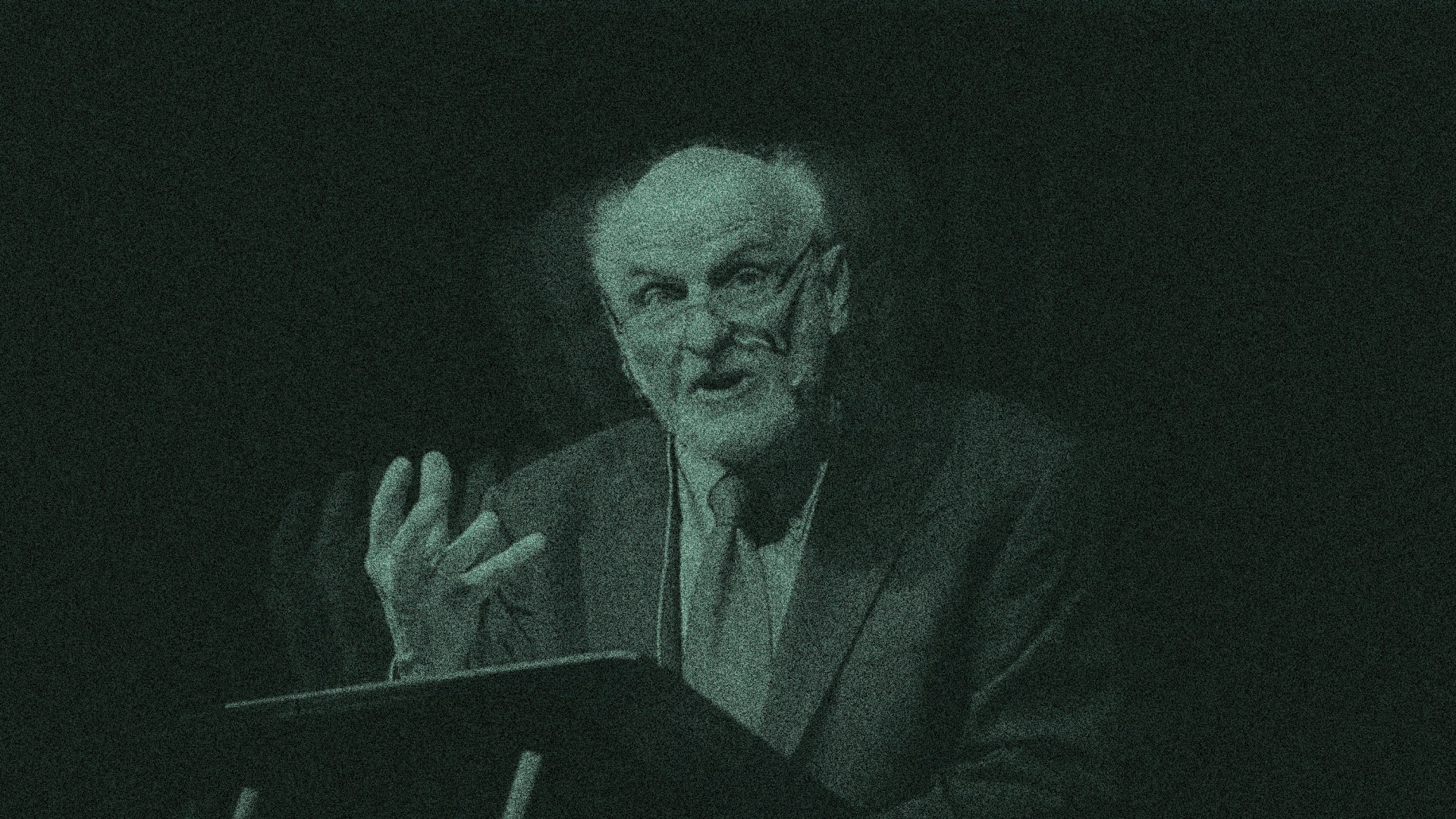Walter Brueggemann has died.
But if you’ve ever preached a sermon shaped to surprise, charged with tension, or haunted by hope, then you know his voice has not gone silent. His passing marks the end of a remarkable earthly ministry, but his words are still loose in the world. As Brueggemann himself might say, they’re still dangerous. Because they still dare to speak of God.
Brueggemann never saw preaching as mere instruction or religious pep talks. He insisted, again and again, that real preaching is an act of poetry—dangerous, disruptive, and drenched in God’s imagination.
“The poet/prophet,” he wrote in Finally Comes the Poet “is a voice that shatters settled reality and evokes new possibility in the listening assembly.” That voice, for Brueggemann, was always poetic in its bones—artful, evocative, unsettling. And it was never tame.
Finally Comes the Poet was the book that gave many of us in the pulpit permission to stop preaching like technicians and start preaching like artists. At a time when sermon outlines were becoming indistinguishable from college lectures or TED Talks, Brueggemann reminded us that the gospel doesn’t fit into three alliterated bullet points. It erupts. It lingers. It builds a world and invites us to enter.
For Brueggemann, the sermon’s purpose was not to inform. It was to destabilize. His words didn’t just explain Scripture—they made it quake. He didn’t champion the poet/prophet for stylistic flourish but for theological necessity. He believed, with the biblical prophets, that language could open or close the human heart to God. So we must speak carefully. Or better: daringly.
In The Prophetic Imagination, Brueggemann lays out the anatomy of prophetic ministry. He describes the prophet’s work as holding two tasks in tension: evoking grief and summoning hope. In a culture addicted to denial and numbed by consumerism, the prophet speaks to break the spell.
“The prophet does not ask if the vision can be implemented,” he writes. “For questions of implementation are of no consequence until the vision can be imagined. The imagination must come before implementation.” That line should be painted on the door of every preacher’s office. In Brueggemann’s world, imagination isn’t escapism—it’s resistance. To preach imaginatively is to defy the powers that be and proclaim another way is possible.
That’s where A Way Other Than Our Own comes in. That little book—structured as a Lenten devotional—is vintage Brueggemann. It’s full of short reflections, sharp phrases, and a deep sense of Scripture as the ground of alternative life. “Lent is about noticing,” he says. Noticing the lies we’ve accepted. Noticing the fears we’ve baptized. Noticing the illusions that masquerade as truth. But also—just as critically—noticing God’s steady, surprising work in the wilderness.
Preaching, for Brueggemann, was wilderness work. It wasn’t about relevance. It was about resistance. And that tone—that urgency, that poetry, that holy defiance—is the legacy many of us carry forward. Not just his theology, but his was way of speaking it to the saints.
He had a gift for phrasing things in ways that made you squirm and smile at the same time. He could drag Israel’s ancient drama right into your living room. Quote Jeremiah and make it sound like he’d been reading the morning paper. Talk about Pharaoh’s rebellion with such clarity, it felt like you could name your own.
Underneath that sharp edge was always a deep pastoral well of compassion. That’s why Prayers for a Privileged People still stuns. In those prayers, Brueggemann speaks not from the scholar’s chair but from the pastor’s heart. He confesses. He pleads. He weeps. His prayers are bruised and bold—full of trembling faith in a God who listens and who still dares to act. Reading them, you get the sense that, for Brueggemann, preaching and prayer are one and the same. Both were ways of speaking honestly to and about God in a world grown cynical.
That honesty—that refusal to sentimentalize God—was one of Brueggemann’s great gifts to the church. He never polished the Prophets. He never smoothed out the Psalms. He let their anguish linger. And he let their hope rise with force.
In an age obsessed with metrics and strategies, Brueggemann called preachers to embrace mystery again. “I want to consider preaching as a poetic construal of an alternative world,” he wrote.
The purpose of such preaching is to cause us to cherish the truth, to open the truth from its pervasive reductionism in our society, to break the fearful rationality that keeps the news from being new.
That’s a tough word to live into. It means the sermon isn’t about control. It’s about trust. You’re not just delivering content; you’re stewarding a holy disruption. That’s risky. But it’s also faithful.
Walter Brueggemann believed the Bible speaks a world into being. And preaching, at its best, participates in that generative speech. So we don’t just explain what the text meant—we let it speak now. We let it summon courage. We let it expose empires. We let it name grief and offer unimaginable joy. That’s what he taught us to do.
For those of us who preach, his legacy isn’t just in the footnotes—it’s in the posture. He taught us to stand before the text with awe. To enter the pulpit with trembling. To honor the poetry of God’s speech, not just the logic of our own. It’s not that he was against clarity—he was against flattening. Against reducing the mystery to technique. Against offering answers where Scripture offers only presence.
In a world where Christianity often sells itself as a system of certainty, Brueggemann invited us to rediscover faith as holy disorientation. “The gospel is not a set of certitudes,” he reminded us, “but an invitation into pilgrimage.” His words always pointed us somewhere: toward the margins, toward the ache of exile, toward the wild fidelity of God.
That’s why his death matters—not just because a scholar has passed but because a poet of the kingdom has gone quiet. Yet his words are still ringing in pulpits and pews around the world. His imagination reshaped ours. His fearless fidelity to the biblical witness gave us a way to speak again—not as marketers, not as managers, but as prophets and poets and people of the Book.
There is a kind of preaching that tells the truth.
And another kind that lets the truth.
Brueggemann showed us how to do the latter.
He taught us how to stand between Pharaoh and the Promised Land and still sing. Still preach. Still trust.
He showed us that the gospel is not polite. It does not settle. It breaks chains and builds futures.
What does his legacy mean for preaching? It means we must stop settling for safe speech. It means our churches must recover a preaching identity that is both poetic and prophetic. It means we must believe again that the Word is alive and that, when we speak it faithfully, it speaks us into newness.
To preach in the shadow of Brueggemann’s life is to accept the risk of awe. It is to believe that the Word of God is not a relic but a river. Not a formula but a fire.
And if we dare to enter it, we may just emerge speaking like poets. Like prophets. Like people who have been undone—and remade—by grace.
So, no, this is not an obituary. This is a thank you. A vow. A prayer.
Thank you, Walter Brueggemann, for teaching us to speak with holy imagination.
We vow to keep preaching with fire and poetry.
And we pray: Lord, let the poets keep coming.
Sean Palmer is the teaching pastor at Ecclesia Houston, a writer, a speaking coach, and the author of Speaking by the Numbers.











